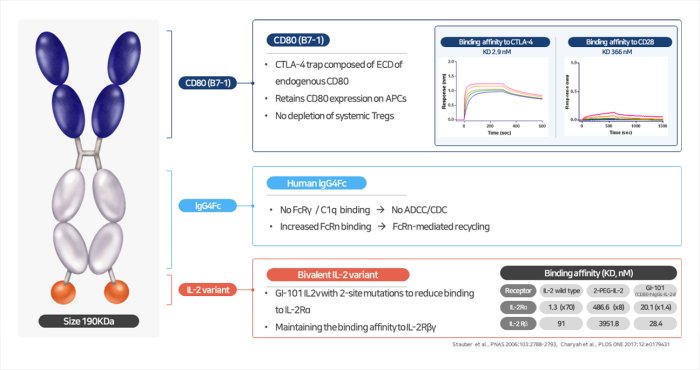

GI Innovation
- Home
- Companies
- GI Innovation
- Products
- Model GI-101 - Novel Bispecific Fusion ...
Model GI-101 -Novel Bispecific Fusion Protein for Immuno-oncology
FromGI Innovation
Promotes the generation of cancer-specific effector T cell (Teff) in lymph nodes, and induces the activation and proliferation of tumor-infiltrating Teff and NK cells. Controls the immuno-suppressive function of regulatory T cells (Tregs) in tumor microenvironment (TME). Restores T cell function and anti-cancer immune responses in TME. Secures its safety in GLP toxicity study.
Most popular related searches
T-cell
natural killer cell
cancer specific
cancer cell
immune response
tumor microenvironment
killer cells
antigen present
antigen presentation
immune suppressive
-
Maintaining CD80 expressionIn lymph nodes, CD80 of antigen-presenting cells (APCs) binds to CTLA-4 of regulatory T cells (Treg), which in turn, downregulates the expression of CD80. By binding to CTLA-4 on Treg, GI-101 maintains CD80 expression on APC.
-
02T cell ActivationAPC presents cancer antigens to Naive T cells (Naïve T), which is accompanied by the binding of CD80 on APC and CD28 on Naïve T. This activates Naïve T into cancer-specific T cells that can target and kill cancer cells.
-
03T cell ProliferationThe IL-2 variant (Interleukin-2 variant) of GI-101 acts as a signal transmitter which promotes the activation and proliferation of cancer-specific, effector T cell (Teff) by binding to its IL-2 receptors.
-
04Restoring T cell functionTeff travels to the tumor microenvironment (TME) and faces a variety of immune suppressive signals. In TME, CD80 of GI-101 binds to CTLA-4 expressed on the surface of Teff and Treg,
restoring anti-cancer immune responses. -
05Tumor Cell DeathThe IL-2 variant of GI-101 binds to the IL-2 receptors of Teff and natural killer cells (NK cell). This activates Teff and NK cell, further promoting tumor cell death in TME.

